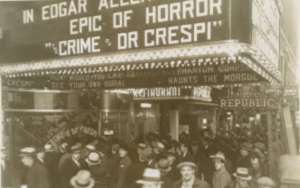HALLOWEEN WEEK 2021: THE CRIME OF DR. CRESPI (1935). “a twisted story.”
 “The Crime of Dr. Crespi starts where Frankenstein left off!” — advertising tagline for The Crime of Dr. Crespi
“The Crime of Dr. Crespi starts where Frankenstein left off!” — advertising tagline for The Crime of Dr. Crespi
In front of the camera Erich von Stroheim was known to the public as “The Man You Love to Hate.” Behind it he might have been known as “The Man the Studios Love to Hate” because of his haughty attitude and disregard for the Tinseltown power structure.
In a Hollywood career that spanned forty years the Austrian-born director and actor saw his stock rise and fall many times. He first made a name for himself during WWI playing cruel aristocratic German villains — in one film he actually throws a crying baby out a window! — the stereotype which earned him the title “The Man You Love to Hate.”
In the silent era he was also a much sought after director until his arrogance (he made a nine-hour movie called Greed), budgetary follies (he was the first director to spend over one million dollars on a film) and attention to detail (his scripts were often as long as the novels he was adapting) made him unemployable by the big studios. Unable to find important work behind the camera he was forced to concentrate on performing.
Despite his hatred for acting — he couldn’t remember his lines and didn’t like taking orders — he was a striking screen presence. His well-crafted pompous screen persona was put to good use in Jean Renoir’s La Grande Illusion and Billy Wilder’s Sunset Boulevard, for which he was nominated for the Academy Award for Best Supporting Actor, but it is a little seen 1935 film that captures von Stroheim at his ominous best.
In The Crime of Dr. Crespi, loosely based on Edgar Allan Poe’s The Premature Burial, Von Stroheim plays the embittered titular character, a chain-smoking doctor consumed by thoughts of revenge against Stephen Ross (John Bohn), the current husband of Crespi’s former flame (Harriet Russell). He’d give everything to be her everything again, and hatches a twisted plan to win her back.
The mad doctor gets the chance at vengeance when Ross comes down with a mysterious disease which only Dr. Crespi’s surgical skills can remedy. Unfortunately the operation is not a success and Ross dies shortly after the procedure . . . or does he? In fact Crespi has secretly administered a powerful drug that placed his patient in suspended animation which apes the signs of death. His lifeless body belies the fact that he, horrifyingly, he has all his faculties about him. Knowing that the drug will wear off after a few days Crespi rushes things along, forgoing an autopsy or embalming and makes arrangements to have the sentient man buried alive! Before the funeral Crespi visits Ross at the morgue to gloat over his fate; when the casket is lowered into the grave Crespi’s insane revenge plot is complete.
It isn’t until Crespi’s colleagues, Dr. Arnold (Paul Guilfoyle) and Dr. Thomas (Dwight Frye), become suspicious of the alleged death and have the body exhumed that lovesick doctor is exposed as a murderer.
The Crime of Dr. Crespi makes the best of its poverty row production standards, resourcefully using lighting effects to create a unique visual style that is part Universal Horror and part film noir to create a memorable looking film. As was often the case with these low budget thrillers, there’s little in the way of a musical score, just some stock music that undoubtedly cost the film’s producers little or nothing. No matter, the movie makes an impression because of the twisted story and even more twisted performance from von Stroheim.
The former director’s presence elevates what could have been a run-of-the-mill, bottom of the bill shocker. His characterization of the eccentric doctor is outrageous, a completely unsympathetic bad guy. He portrays mood swings that range from calm and controlled to full-out ballistic. In the latter mode his voice becomes a shrill staccato, a vocal representation of his fractured state of mind.
Director John Auer emphasizes Crespi’s mania with the use of extreme close-ups. The up-close-and-personal shots reveal Crespi’s craziness in riveting detail. The camera work creates an atmosphere of dread and doom that maximizes the story’s thrills and chills.
The supporting actors are fine; they’re journeymen actors who could be relied on to hand in decent performances while working quickly and for little money.
The standout of the secondary cast is Dwight Frye, the character actor who was usually typecast in oddball riffs on his famous roles from Dracula and Frankenstein. In Crespi he is allowed to, for once, strut his stuff as the hero, and sink his teeth into something other than the lunatic roles he usually played. He even gets to flirt with a pretty nurse, something that his most famous alter ego, Fritz the vicious hunchbacked lab assistant in James Whale’s Frankenstein, would never do.
The Crime of Dr. Crespi was likely made as a throwaway, a movie for “the shirtsleeve audience” and not the critics, but it transcends its humble origins by way of inventive direction and an unforgettable central performance from “The Man You Love to Hate.”
